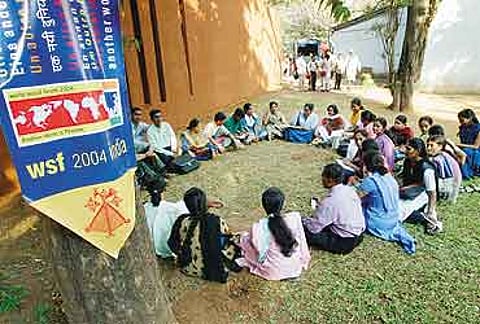The Celebrity Dossier
Flying Trapeze
The circus of dissent comes to town, with a cloud of doubt

From left to right: Joseph Stiglitz, Economist; Shabana Azmi, Actress; Arundhati Roy, Writer; Asma Jehangir,Pakistani Activist; Shirin Ibadi, Iranian Peace Activist; Naomi Klein, Journalist.
Over 100 groups from all over India and more than 30 overseas groups are in the city for the meet. The bill: Rs 142 crore. Many of them have been through a crash course in Indian culture. Mixed with visits to the slums, delegates have been shown the sordid underbelly of India's City of Gold. Cut to performances by Brazilian dance troupes and South African theatre groups, the chaos and colour is complete. Says Ila Hukku, director of development support at CRY: "Bombay is also a showcase for what can go wrong with globalisation. It shows the hard edges of those not equipped to deal with it."
Even as the first delegation of Pakistani trade union groups in mirror-work caps mingled with the Honduran peasants in dreadlocks at the WSF venue in suburban Goregaon, the leader of the Pakistani group was shooting off e-mails saying the rest of them were denied visas and they will come to the Wagah border to protest.
This is the first time the WSF is meeting in Mumbai. "We realised that while we were fighting globalisation, we were not global ourselves," says Candido Grybowski, director-general of the influential Brazilian think-tank, IBASE. The shift in its venue is only temporary. The WSF will return to Porto Alegre next year. The forum is in Mumbai to incorporate Asian and African issues into a platform that has so far been dominated by its Latin American and European initiators.
In fact, more than 86 per cent of the participants at the WSF last year were Brazilians. The rest represented European NGOs and other Latin American countries. While it voices the concerns of the masses, its members include not merely the dispossessed and marginalised of the earth but denizens of the world of ideas too. In fact, 75 per cent delegates had university degrees. "It was beginning to look like any other global meet," says Soren Ambrose, an international committee member from the US who works with a group called Grassroots and has brought 100 activists from his country. The Mumbai meet is expected to make the WSF more international and representative, therefore many Indian groups have been invited to it.
The entire activist-NGO pantheon of India is taking part. A 'bipartisan' Arundhati Roy (she will also address the rival Mumbai Resistance), Medha Patkar, Shabana Azmi, Shabnam Hashmi, Aruna Roy, Harsh Mander, Prakash Karat. There is a 500-strong delegation from Pakistan, Asma Jehangir included, and a 450-strong Bangladeshi presence. Among the foreign guests are economists Joseph Stiglitz and Jean Dreze, anti-globalisation journalist Naomi Klein and former Algerian president Ahmed Ben Bella. Notable absentees are Nelson Mandela and Noam Chomsky.
The six-day forum includes public meetings, 1,200 seminars and debates focusing on imperialist globalisation, militarism and peace, religious fanaticism, sectarian violence, caste and descent (lineage) exclusions and patriarchal discrimination.

Mumbai being the venue, there's an India focus to the meet.Smaller and uniquely Indian people's movements are at the forum. "We can learn from Indian people's movements that are effective but not violent," says Grybowski. According to him, new issues like communalism and casteism will be taken up at the forum for the first time. Shabnam Hashmi, whose NGO -Anhad will host a seminar on religious extremism, says the forum will allow organisations like hers to develop national and international networks.
The Indian organisers—a 45-member India organising committee made up of scientists, academics and activists—have also made more space for participants to organise their own seminars and panel discussions rather than building the activities around those organised by the WSF secretariat. It means that participants can now make what they want of the forum. But it could also turn out to be disparate, "more talk with less action", as critics have already alleged.
In fact, the 'no action' charge has also been raised by many involved with the WSF from its inception. At orientation sessions for the Via Campesina, a Honduras-based international peasant movement, members have been asking why there is so much talk and so little coming out of the WSF. The organisers' defence: the WSF allows thousands of smaller groups to have discussions and formulate strategy under its tent but does not come out with any collective statement or opinion. This helps to hold together very disparate groups that are part of the dialogue despite their different views on globalisation. Bernard Cassens, president of the French organisation ATTAC and one of the founders of WSF, says, "We're not just protesters, our ambition is to propose credible alternatives to show that another world is possible." The WSF's slogan is: 'Another World is Possible'. But critics say its diverse groups have very different views of what it would look like and how to get there.
One charge against the WSF is that it accepts funding from agencies that are said to be close to their governments such as the Ford Foundation, Oxfam and the ICCO of the Netherlands. So, this time there has been much soul-searching and the Indian organisers decided not to accept funds from the Ford Foundation. It will also publish a list of donors with the programme sheets. The committee says it'll make up for the shortfall by charging a registration fee from delegates. But declining Ford Foundation largesse and moving out of Brazil, where the ruling Workers' Party was one of the largest donors, will hit the WSF financially.
So, what will the forum achieve? Sure, there will be many lively exchanges. But will the world change? WSF supporters say yes. But its detractors see it as another Woodstock that promised an end to all wars in the world. That was in 1969.
Tags